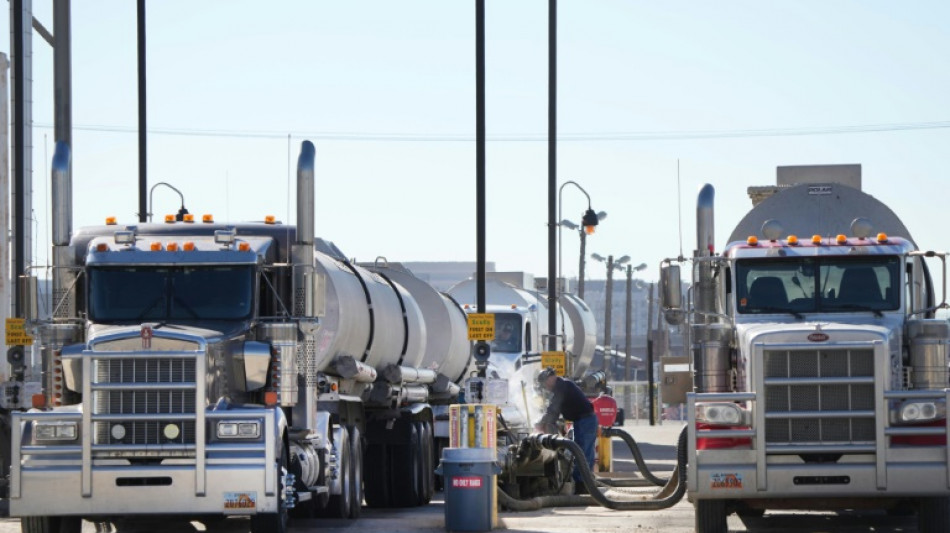
-
 Japan PM's tax giveaway roils markets and worries voters
Japan PM's tax giveaway roils markets and worries voters
-
Amid Ukraine war fallout, fearful Chechen women seek escape route

-
 Rybakina surges into Melbourne semis as Djokovic takes centre stage
Rybakina surges into Melbourne semis as Djokovic takes centre stage
-
Dollar struggles to recover from losses after Trump comments

-
 Greenland blues to Delhi red carpet: EU finds solace in India
Greenland blues to Delhi red carpet: EU finds solace in India
-
Will the EU ban social media for children in 2026?

-
 Netherlands faces 'test case' climate verdict over Caribbean island
Netherlands faces 'test case' climate verdict over Caribbean island
-
Rybakina stuns Swiatek to reach Australian Open semi-finals

-
 US ouster of Maduro nightmare scenario for Kim: N. Korean ex-diplomat
US ouster of Maduro nightmare scenario for Kim: N. Korean ex-diplomat
-
Svitolina credits mental health break for reaching Melbourne semis

-
 Japan's Olympic ice icons inspire new skating generation
Japan's Olympic ice icons inspire new skating generation
-
Safe nowhere: massacre at Mexico football field sows despair

-
 North Korea to soon unveil 'next-stage' nuclear plans, Kim says
North Korea to soon unveil 'next-stage' nuclear plans, Kim says
-
French ex-senator found guilty of drugging lawmaker

-
 US Fed set to pause rate cuts as it defies Trump pressure
US Fed set to pause rate cuts as it defies Trump pressure
-
Sleeping with one eye open: Venezuelans reel from US strikes

-
 Venezuela's acting president says US unfreezing sanctioned funds
Venezuela's acting president says US unfreezing sanctioned funds
-
KPop Demon Hunters star to open Women's Asian Cup

-
 Trump warns of 'bad things' if Republicans lose midterms
Trump warns of 'bad things' if Republicans lose midterms
-
Russian strikes in Ukraine kill 12, target passenger train

-
 With Maduro gone, Venezuelan opposition figure gets back to work
With Maduro gone, Venezuelan opposition figure gets back to work
-
Celebrities call for action against US immigration raids

-
 Rubio to warn Venezuela leader of Maduro's fate if defiant
Rubio to warn Venezuela leader of Maduro's fate if defiant
-
Denver QB Nix 'predisposed' to ankle injury says coach

-
 Lula, Macron push for stronger UN to face Trump 'Board of Peace'
Lula, Macron push for stronger UN to face Trump 'Board of Peace'
-
Prass stunner helps Hoffenheim go third, Leipzig held at Pauli

-
 Swiss Meillard wins final giant slalom before Olympics
Swiss Meillard wins final giant slalom before Olympics
-
CERN chief upbeat on funding for new particle collider

-
 Trump warns US to end support for Iraq if Maliki returns
Trump warns US to end support for Iraq if Maliki returns
-
Judge reopens sexual assault case against goth rocker Marilyn Manson

-
 South Korea's ex-first lady to learn verdict in corruption case
South Korea's ex-first lady to learn verdict in corruption case
-
Rosenior dismisses Chelsea exit for 'untouchable' Palmer

-
 Markram powers South Africa to win over West Indies
Markram powers South Africa to win over West Indies
-
Vladimir Padrino: Venezuela's military power broker

-
 Amazon closing Fresh and Go stores in Whole Foods push
Amazon closing Fresh and Go stores in Whole Foods push
-
Koepka nervous about game and fans in PGA Tour return

-
 Trump's Iowa trip on economy overshadowed by immigration row
Trump's Iowa trip on economy overshadowed by immigration row
-
Dortmund coach says Inter Milan are improved under Chivu

-
 US border chief in Minneapolis as Trump tries to calm crisis
US border chief in Minneapolis as Trump tries to calm crisis
-
What to know about America's colossal winter storm

-
 Iran warns against 'instability' after US strike group arrives
Iran warns against 'instability' after US strike group arrives
-
GM reports quarterly loss but boosts shareholder returns

-
 US banks fight crypto's push into Main Street
US banks fight crypto's push into Main Street
-
NFL Bills make offensive coordinator Brady new head coach

-
 TikTok settles hours before landmark social media addiction trial
TikTok settles hours before landmark social media addiction trial
-
Newcastle braced for 'ultimate test' against PSG after storm disruption

-
 Brook blitz ends Sri Lanka's unbeaten home run, England clinch series
Brook blitz ends Sri Lanka's unbeaten home run, England clinch series
-
LVMH 2025 net profit drops 13% to 10.9 bn euros

-
 Philip Glass pulls Kennedy Center premiere after Trump takeover
Philip Glass pulls Kennedy Center premiere after Trump takeover
-
Slot says Liverpool must fix 'very bad cocktail'


In climate fight, rich nations must give up oil first: report
Rich countries must end their oil and gas production by 2034 to cap global warming at 1.5 degrees Celsius and give poorer nations time to replace fossil fuel income, according to a report released Tuesday.
The 70-page analysis from the Tyndall Centre for Climate Change Research comes as nearly 200 nations kicks off a two-week negotiation to validate a landmark assessment of options for reducing carbon pollution and extracting CO2 from the air.
The overarching objective, enshrined in the 2015 Paris Agreement, is to cap global warming "well below" 2C, and 1.5C if possible.
A torrent of research since 2015, along with a crescendo of deadly extreme weather across the globe, has confirmed that the lower aspirational target is by far a safer threshold.
Some poorer nations produce only a tiny percentage of global output but are so reliant on fossil fuel revenues that rapidly removing this income could undercut their economic or political stability, the Tyndall Centre report shows.
Countries such as South Sudan, the Republic of Congo and Gabon have little economic revenue apart from oil and gas production.
By contrast, wealthy nations that are major producers would remain rich even if fossil fuel income were removed.
Oil and gas revenue, for example, contribute eight percent to US GPD, but the country's GDP per capita would still be about $60,000 -- second highest in the world among oil and gas producing nations -- without it, according to the report.
"We use the GDP per capita that remains once we've removed the revenue from oil and gas as an indicator of capacity," lead author Kevin Anderson, a professor of energy and climate change at the University of Manchester, told AFP.
There are 88 countries in the world that produce oil and gas.
"We calculated emissions phase-out dates for all of them consistent with the Paris Agreement temperature goals," Anderson said.
"We found that wealthy countries need to be at zero oil and gas production by 2034."
- First coal, then oil & gas -
The very poorest countries can continue to produce out to 2050, according to the calculation, and other countries such as China and Mexico are somewhere in between.
When countries signed the Paris climate treaty, it was accepted that wealthy nations should take bigger and faster steps to decarbonise their economies and provide financial support to help poorer countries wean themselves of fossil fuels.
The principle has already been applied to coal-power generation, with the UN calling on rich OECD countries to phase out coal use by 2030, and the rest of the world by 2040.
The new report, Phaseout Pathways for Fossil Fuel Production, applies the same approach to oil and gas.
For a 50/50 chance of limiting the rise in global temperatures to 1.5C, 19 countries in which per capita GDP would remain above $50,000 without oil and gas revenue must end production by 2034.
Included in this tranche are the US, Norway, Britain, Canada, Australia and the United Arab Emirates.
Another 14 "high capacity" nations where per capita GDP would be about $28,000 without income from oil and gas must end production in 2039, including Saudi Arabia, Kuwait and Kazakhstan.
The next group of countries -- including China, Brazil and Mexico -- would need to end output by 2043, followed by Indonesia, Iran and Egypt in 2045.
Only the poorest oil and gas producing nations such as Iraq, Libya and Angola could continue to pump crude and extract gas until mid-century.
"This report illustrates only too clearly why there also needs to be an urgent phase-out of oil and gas production," said Connie Hedegaard, former European Commissioner for climate, and Danish minister for climate and energy.
The Russian invasion of Ukraine, she noted, has "made it abundantly clear that there are numerous reasons why the world needs to get off its dependence on fossil fuels."
Romain Ioualalen, global policy lead at Oil Change International, said the report is a "stark indictment of the climate failure" of wealthy nations.
"Rich countries have twelve years to end their production of oil and gas but none has any plans to do so," he said.
"In fact, not only do they still account for more than a third of global production, but they also plan to produce five times as much oil and gas by 2030 as is compatible with the trajectory outlined in this report."
J.Horn--BTB




